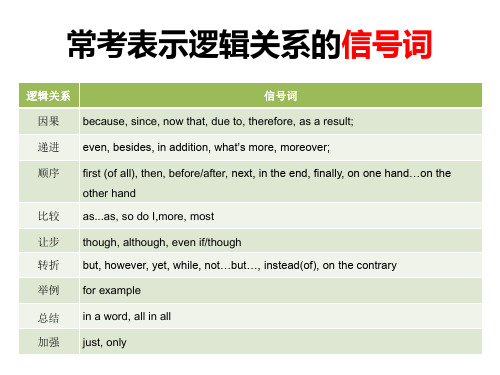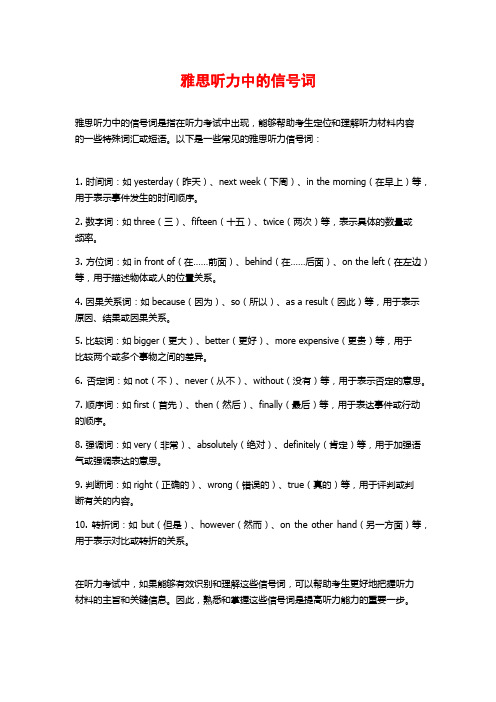信号词
初三英语常考表示逻辑关系信号词

让步 转折 举例
though, although, even if/though but, however, yet, while, not…but…, instead(of), on the contrary for example
总结 加强
in a word, all in all just, only
常考表示逻辑关系的信号词
逻辑关系
信号词
因果 because, since, now that, due to, therefore, as a result;
递进 even, besides, in addition, what’s more, moreover;
顺序 比较
first (of all), then, before/after, next, in the end, finally, on one hand…on the other hand as...as, so do I,more, most
配套套题答案
文章主要讲述了,成功的要诀.制定目标并定期回顾目标会增加你成功的机会.设定目标是在任何领域取得成功的最重要和必 要的步骤,从一种欲望开始,然后是一个书面目标,接下来是正确的态度和行动,你会一步一步的到达成功. 【解答】ADBBD CAC
1.A 考查名词,A.difference不同点 B.surprise惊讶 C.hope希望 D.sale 出售,根据lies in setting and reviewing goals regularly,可知是指在制定和定期回顾目标之间的区别,故选A. 2.D 考查动词,A.sing 唱歌 B.dance跳舞 C.light 照亮 D.disappear 消失,根据You could pay no attention to them, 可知是指你不要去关注它们,让它们从你的脑子里消失,故选D. 3.B 考查名词,A.tools工具 B.excuses借口 C.stories故事 D.examples例子, 根据后文Whatever it is,I am sure your excuse is limiting you.不管它是什么,我相信你的借口是限制你的,推出此处是借口,故选B. 4.B 考查形容词,A.excited激动的 B.unclear不清楚的 C.sure 确信的 D.unhappy 不开心的,根据If you are…about what you want,you might end up at a certain age with things that you didn,t want,结合选项,推出句意:如果你不清楚你想 要什么,你可能会在一定的年龄带着你不想要的东西结束了你的梦想,故选B. 5.D 考查动词,A.imagine 想象 B.feel 感觉 C.stop停止 D.keep保持, 根据you moving closer to what you want,结 合选项,可知是指:让你不停的接近你想要的,keep doing sth,持续做某事,故选D. 6.C 考查名词,A.steps 台阶 B.decisions决定 C.choices 选择D.wishes 希望,根据后文wishful thinking,or taking action. 可知这是指两个选择,故选C. 7.A 考查副词,A.slowly慢慢地 B.suddenly突然地 C.luckily幸运地 D.sadly难过地, 根据one by one until you reach success,可知慢慢的,你会一步一步的到达成功,故选A. 8.C 考查动词,A.decided 决定 B.corrected纠正 C.followed 跟随 D.built 建造,根据It begins with a desire,and then a written goal…by the right attitude and action,结合选项,推出句意:它从一种欲望开始,然后是一个书面目标,接下来是正 确的态度和行动,故选C.
逻辑关系信号词

sure enough, to be sure, especially, above all, in particular, particularly, most importantly, most important of all
比 较 相 同 事 物 的 词 : similar to, similarly, likewise, correspondingly
表示列举(enumeration): Firstly, …secondly,… finally, in the first place, in the second place, to begin with, to start with, first of all, next, also, after that, then
表示递进的词: first…second…, in addition (to), therefore, moreover, then, another, likewise, furthermore, next, not only…but also…
表 示 总 结 归 纳 的 词 : in conclusion, all in all, generally speaking, in general, on the whole, to sum up, in summary
对比不同事物的词: differ from, otherwise, in contrast (to), on the contrary, whereas, the former…the latter…, unlike
表 示 因 果 关 系 的 词 : so, consequently, thus, therefore, accordingly, as a result(of), so that, because, since, now that, it follows that, for this reason, for fear that
四大时态信号词

四大时态信号词
一般现在时
标志词:always(总是) usually(通常) often(经常) sometimes(有时) never(从不) every(每一)
使用方法
1.通常,习惯性的动作。
2.表示特征状态的时候。
3.表示客观事实的时候。
4.动词形式为do。
例句:I often get up at 6. 我通常早上6点起床
一般过去时
标志词:tomorrow(明天),soon(不久),will(将要=be going to)
使用方法
一般过去时通常表示某个过去的时间点所发生的动作。
例句:I had breakfast.我吃过早饭了。
一般将来时
标志词:yesterday(昨天),ago(以前),before(在...之前)
使用方法
1.表示在过去某个时间发生的动作,或是状态。
2.过去经常发生的动作和状态。
例句:Li Hua will go to Peking University.李华将会去北大上学。
现在进行时
标志词:now(现在), look(看),listen(听)
使用方法
1.现在正在发生的事情。
2.现阶段正在进行的动作。
例句:I am swimming now. 我正下游泳。
雅思听力中的信号词

雅思听力中的信号词雅思听力中的信号词是指在听力考试中出现,能够帮助考生定位和理解听力材料内容的一些特殊词汇或短语。
以下是一些常见的雅思听力信号词:1. 时间词:如yesterday(昨天)、next week(下周)、in the morning(在早上)等,用于表示事件发生的时间顺序。
2. 数字词:如three(三)、fifteen(十五)、twice(两次)等,表示具体的数量或频率。
3. 方位词:如in front of(在……前面)、behind(在……后面)、on the left(在左边)等,用于描述物体或人的位置关系。
4. 因果关系词:如because(因为)、so(所以)、as a result(因此)等,用于表示原因、结果或因果关系。
5. 比较词:如bigger(更大)、better(更好)、more expensive(更贵)等,用于比较两个或多个事物之间的差异。
6. 否定词:如not(不)、never(从不)、without(没有)等,用于表示否定的意思。
7. 顺序词:如first(首先)、then(然后)、finally(最后)等,用于表达事件或行动的顺序。
8. 强调词:如very(非常)、absolutely(绝对)、definitely(肯定)等,用于加强语气或强调表达的意思。
9. 判断词:如right(正确的)、wrong(错误的)、true(真的)等,用于评判或判断有关的内容。
10. 转折词:如but(但是)、however(然而)、on the other hand(另一方面)等,用于表示对比或转折的关系。
在听力考试中,如果能够有效识别和理解这些信号词,可以帮助考生更好地把握听力材料的主旨和关键信息。
因此,熟悉和掌握这些信号词是提高听力能力的重要一步。
在过去的多长时间里,信号词

在过去的多长时间里,信号词一般过去时的信号词:yesterday,last night,ago,this morning,just now,the other day。
一般过去时时间状语1、yesterday(morning,afternoon,evening)2、the day before yesterday3、last night (week,Sunday,weekend,month,winter,year,century世纪)4、ago5、this morning/afternoon/evening6、when引导的状语从句(动词过去时)7、just now8、the other day--a few days ago.9、at the age of 10(过去年龄段)10、in the old days11、at that time12、in the+整十数年份+s(⋯世纪⋯年代)13、used to do...(过去做...)一般过去时标志性词语yesterday,the day before yesterday,last week/month/year,just now,a moment ago,long long ago,once upon a time,ago,in 1997,at the age of,one day,then,on that day一般过去时记忆口诀一般过去时并不难,过去动作、状态记心间。
动词要用过去式,时间状语句末站。
否定句很简单,didn't 站动原前,其它部分不要变。
一般疑问句也好变,did放句子前,主语、动原、其它部分依次站立。
特殊疑问句也简单,疑问词加一般疑问句记心间。
一般过去时表示过去某个时间或某一段时间内发生的动作或存在的状态,常和过去的时间状语连用。
初中必考时态信号词

初中必考时态的信号词一、一般现在时(一现)1)一个动作由百分之百到百分之零变化的频率副词,在句子中做时间状语always总是,usually通常,often经常,sometimes 有时,seldom很少,never从不位置:a) be动词/情态动词之后;实义动词之前b)sometimes既可以置于句首,句中,也可以置于句尾2)every 短语every day每天, every week每周,every month每月, every year每年位置:常置于句尾,有时为了强调时间也置于句首,但置于句首时,后要加逗号。
特词:how often 多久一次2)次数+时间three times a day一天三次,once a week一周一次, twice a month一月两次位置:常置于句尾特词:how often 多久一次二、一般过去时(一过)1)今天(需要有参照时间):this morning今天上午, this afternoon今天下午, this evening今天傍晚,tonight今晚2)昨天:yesterdayyesterday morning, yesterday afternoon, yesterday evening, last night 3)前天:the day before yesterdaythe day before yesterday in the morning, the day before yesterday in the afternoon,the day before yesterday in the evening,4)last 短语last night, last week,last month, last year5)the 名词+before lastthe night before last, the week before last, the month before last, the year before last6)时间段+agotwo days ago five years ago7)其他信号词several days ago=the other day, just now特词:when三、一般将来时(一将)1)今天(需要有参照时间):this morning今天上午, this afternoon今天下午, this evening今天傍晚, tonight今晚2)明天:tomorrowtomorrow morning, tomorrow afternoon, tomorrow evening, next night3)后天:the day after tomorrowthe day after tomorrow in the morning, the day after tomorrow in the afternoon,the day after tomorrow in the evening,4)next 短语next night, next week, next month, next year5)the 名词+after nextthe night after next, the week after next, the month after next, the year after next6) in 时间段’s time/ in 时间段’s/ in 时间段in two days’ time , in five years’, in five years7)其他信号词soon:不久,in the future/ in future特词:when四、现在进行时(现进)1.句首:look,listen2.句中:still3.句尾:now,at the moment,at this time4.其他:these days,be quiet,be quick五、过去进行时(过进)1.单句:then,at that moment,at that time时间点+过去时态的信号词2.复合句:一个句子中,如果出现两个动词,短暂性动词常用过去时态,延续性动词常用过去进行时一过+when+过进过进+when+一过一过+while+过进过进+while+过进一过+as+过进一过+just as +过进六、现在完成时(现完)1.已经:already 用于肯定句中,置于have/has和P.P之间yet 用于否/疑中,置于句尾2.以前:before 往往置于句尾,可以独立出现,也可以“时间段+before”的形式出现3.ever 曾经:常用于疑问句中just 刚刚:常用于肯定句的句中never 从不:常用于肯定句的句中tely(近日)=recently(近来)=these days(这些天)5.for+时间段=since+时间点=since+时间段+ago6.复合句:since+一过七、过去完成时(过完)1.过完+before+一过过完+when+一过一过+after+过完2.只要谓动发生在“过去的过去”就用过去完成时。
handout-记笔记的信号词

记笔记要点九大类信号词1.时间顺序(Time-Sequence)2.举例(Example)3.列举(Enumeration)4. 补充(Continuation)5.比较或反差(Comparison or Contrast)6.强调(Emphasis)7.因果(Cause-Effect)8.总结(Summary)9.定义(Definition)一、时间顺序(Time-Sequence)例词first, later, next, finally, before, after, now, previously, last, then, when, immediately, formerly, subsequently, presently, initially, ultimately meanwhile 含义:按时间顺序叙述事件二、举例(Example)例词:for example, such as, for instance, illustrate含义:举例说明中心想法e.g. Black English used to be considered simply poor English until linguists realized that the so-called errors were actually consistent alternative grammatical forms, some of which originated in African linguistic patterns. For example, the word "be" in standard English is primarily used as part of the infinitive "to be." But in Black English, "be" can also be used to indicate a repeated action or existential state .Q: What does this example indicate?The black English is not poor English but an alternative grammatical form.三、列举(Enumeration)例词:and, too, finally, furthermore, first(ly), second, third, last, another, next 含义:说话人罗列观点(有时想暗示各观点不同的重要性)e.g. Firstly, I would like to talk about classical music and its representative composers. Next I would like to talk about Jazz music and some influential albums in the history of Jazz. Finally, I will move on to pop music in the last century.Q: What kind of music does this person want to talk?Three categories: classical music, Jazz, and Pop music四、补充(Continuation)例词:also, in addition, and, further, another, as well as含义:说话人在继续讨论同一话题,并欲补充更多的信息e.g. A computer is often called a “thinking machine,” and in many ways it is just that. Computers perform difficult and timesaving mathematical computations, as well as problems in logic and reasoning. In addition, computers run other machines and answer questions. Also, they are used to guide astronauts on take-off.Q:What functions do computer have?Five Functions: Difficult Maths computations / deal with problems logically / control other machines/ answer questions /guide astronauts to take off.五、比较或反差(Comparison or contrast)比较类(comparison)例词:like, likewise, as, similarly, at the same time,as well as, both, all, in comparison,反差类(contrast)例词:on the other hand, in contrast, despite,nevertheless, yet, instead, rather, though,regardless, unlike, although, even though,whereas , but, in spite of, on the contrary,however含义:说话人想说出一个与之前的观点相同,不甚相同甚至是相反的观点:e.g. The sex of the instructor affected the extent of active student participation. In classes taught by men with roughly equal proportions of male and female students, male students were responsible for about 75% of all class discussion. Similarly, with women as instructors, female student participation rose from 25% to 42%; in contrast, male participation slipped from 75% to 58%.Q:What’s main idea of this paragraph?Students’ class participation differs according to the sex of the instructors. Male students are more active in male instructors’ classes while female students prefer to respond to the female teachers’ classes.六、强调(Emphasis)例词:important to note, most, above all, especially valuable, a central issue, especially relevant, should be noted, the most substantial issue, remember that, a major event, the principal item, pay particular attention to, the chief factor, most of all, a significant factor, a primary concern, a key feature, the main value 含义:说话人想说出最重要最核心的内容,说话人用这些词引起听众的注意:e.g. Although the resources of our world are limited, the wants of people are not. Indeed, one of the most important assumptions of economics is that the total human wants can never be satisfied. No matter how much we have, we seem to want more. As people's income increase, so does their desire for more and better goods and services.Q: Can you briefly summarize this paragraph?People seem to have unlimited desire for resources.七、因果(Cause-Effect)例词:because, accordingly, for this reason, hence, resulting, as a result, o, then, thus, therefore, since, consequently含义:说话人欲表现两个或多个事物之间的联系,尤其是它们之间的因果关系e.g. Atherosclerosis is the result of the buildup of fat, fibrin, parts of dead cells, and calcium on the inside of the arteries. No one knows what causes this disease, but a number of things can speed its development. These include smoking cigarettes and eating animal fat and cholesterol. Others include age, hypertension,diabetes, stress, heredity, and sex (males have more heart attacks).八、总结(Summary)例词:thus, in short, to conclude, in brief, in the end, in summary, to reiterate, in conclusion, to sum up, finally, therefore, thus, as already stated 含义:说话人欲复述或总结之前的话语e.g. Euthanasia is defined as mercy killing, either by the sick people themselves or by their relatives or close friends. One controversial doctor is a strong proponent of this act: Dr. Jack Krevorkian. Dr. Krevorkian has publicly admitted to giving assistance to people who have committed suicide. As a result, he has been called a saint by some, a murderer by others.Q: What’s people’s attitude towards Dr. Krevorkian?Some people support his behavior while others find it unacceptable.九、定义(Definition)例词:define, is defined as, known as, that is, the term means, we mean, we can state, we refer to含义:说话人欲给术语下定义e.g. Our country has been obsessed with youth for far too many years. Age has been defined only as a decline from a peak of youth. Age is a fate worse than death. Negative stereotypes of older people are reinforced daily in the popular media, which contain very few examples of anyone 60 or older doing anything active or dynamic in society.Q:How do most people feel about age? Why?They feel fearful, because the mass media keeps sending a message that being old is a dreadful thing.TipsFind the signal words when you are reading or listening to the materials.Take advantage of the signal words and form the entire logic structure of the paragraph.。
托福听力对话主旨题信号词

托福听力对话主旨题信号词
听力对话中常用的信号词有:
- 主题相关的信号词:about, discuss, focus on, the main point, the topic
- 提出观点的信号词:2points of view, opinion, argue, suggest, think, believe, claim, consider
- 引起对话的信号词:problem, issue, question, situation, concern - 对话发展的信号词:first, second, furthermore, moreover, in addition, finally, on the other hand, however
- 对比观点的信号词:but, on the other hand, however, although, despite, even though
- 结论的信号词:in conclusion, to sum up, overall, the main idea, the most important thing
- 谈论细节的信号词:detail, example, instance, explain, show, demonstrate, illustrate, evidence, reason, support, fact, statistic
需要注意的是,托福听力对话主旨题的答案可以是对话的总体概括,也可以是对话中主要争论的观点。
因此,在听力过程中要抓住对话的重点内容,同时注意对话中出现的信号词,以帮助理解并准确回答主旨题。
- 1、下载文档前请自行甄别文档内容的完整性,平台不提供额外的编辑、内容补充、找答案等附加服务。
- 2、"仅部分预览"的文档,不可在线预览部分如存在完整性等问题,可反馈申请退款(可完整预览的文档不适用该条件!)。
- 3、如文档侵犯您的权益,请联系客服反馈,我们会尽快为您处理(人工客服工作时间:9:00-18:30)。
阅读关联词汇
Angst/Stress:
gegen Angst, Anti-Stress-Strategien, nervös, Psychologische Tipps dafür
Arbeit:
Hausarbeit, Semesterarbeit, Seminararbeit, Magisterarbeit, Doktorarbeit, Abschlußarbeit, Examensarbeit, Wissenschaftlichearbeit
Arbeit:
Arbeitsplatz, Arbeitsstelle, Arbeitsmöglichkeiten, Arbeitsmarkt, Arbeitsbörse, Job, Beruf, Stellenangebote
Ausland:
Nicht-Deutschland-Länder
Bewerbungstipps:
einen Autrag auf einen Studienplatz/Studienstelle stellen, beantragen, um A sich bewerben, Hilfe bei der Bewerbung um A (Achtung: Bewerbung, Bewertung, Auswertung, Bemühung, Benotung)
Elektrik:
Elektrotechnik, Elektronik, Elektromagnetismus
Examen:
Abschlussprüfung, Prüfung, Test, Staatsexamen, Klausur, Prüfungsvorbereitung
Fachwörter:
Fachbegriffe, Fachtexte, Fachliteratur, Fachausdrucks,Terminus (Termini), Lexikon, Nachschlagwerke
In Deutschland studieren:
Studienstelle, Studienplatz, Studienmöglichkeit, sich bewerben um, beantragen, Antrag auf A. Stellen, Bewerbungstipps, Bewerbungsvorschlänge
Jobben:
um Geld zu verdienen
online-Lesen:
Lesen im Internet, elektronische Bücher
Praktikum:
neben dem Studium, Arbeiserfohrungen sammeln neben dem Studium, Anerkenungsjahr absolvieren, Job neben dem Studium
Romanistik:
Französisch, Italienisch, Rumänisch, Spanisch, Portugiesisich, das Latinum, das Große Latinum
Schüler:
Abiturient (Studienbewerber), Erstsemester/Studienanfänger, Studierende/Student, Absolvent, Akademiker, Hoschulabsolventen, Leute mit Hochschulabschluß, Leute nach dem Examen
Schwiergkeiten/Problem:
Hilfen, Lösungen, greifen zu Dat., sich wenden an Akk.
Stipendium:
Finanzielle Hilfe, Finanzierungsmöglichkeit, BAföG - Antrag, Förderungsgeld, Geld/Gelder zum Studium, Ausbildungsförderung
Studienmöglichkeite:
Studiengänge, Fachrichtungen, Ausbildungsmöglichkeit, Promotionsmöglichkeiten, grundständige und weiterführende Studiengänge
Studienreise:
Exklusion, die Reise zum Lernen/Studieren
üben:
Übungsaufgaben, ü. Lösungen/Schlüssel
大学的主要专业:
Anglistik, Antike, Betriebswirtschaftslehre (BWL), Biologie, Chemie, Deutsch als Fremdsprache, Didaktik, Geographie, Geschichte, Informatik, Journalismus, Linguistik, Jura/Rechtswissenschaft, Literatur, Mathematik, Medien, Medizin, molekulare Biologiem/Medizin, Ökologie, Pädagogik, Philosophie, Physik, Politik, Psychologie, Romanistik, Statistik, Soziologie, Sprachwissenschaft, Volkswirtschaftslehre 欧洲的主要国家:
Belgien, Dänemark, Griechenland,
Großbritannien, Finnland, Frankreich, Irland, Island, Italien, Luxemburg, die Niederlande, Norwegen, Polen, Portugal, Russland, Tschechlen, Österreich, Schweden, die Schweiz, Spanien, die Türkei, Ungarn, die Vereinigten Staaten,
die Vereinten Nationen。
